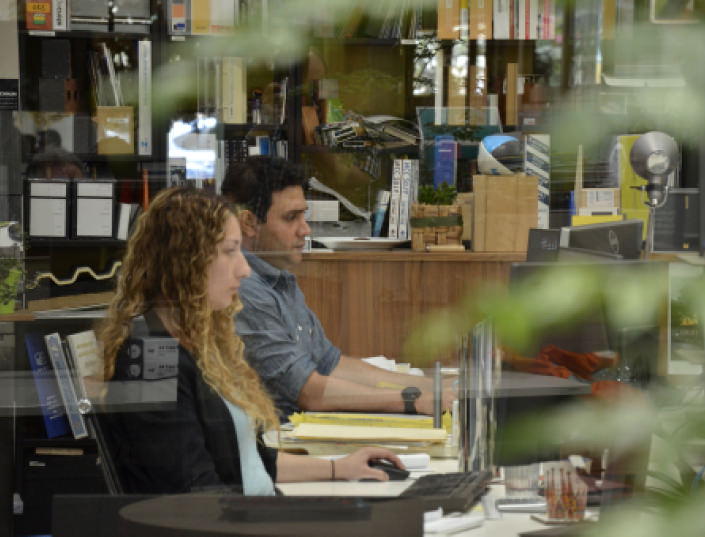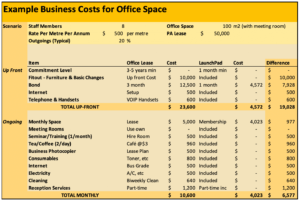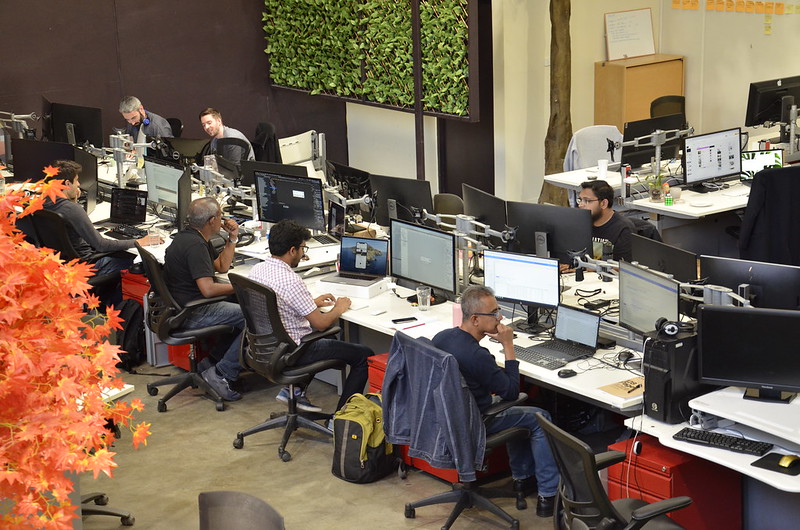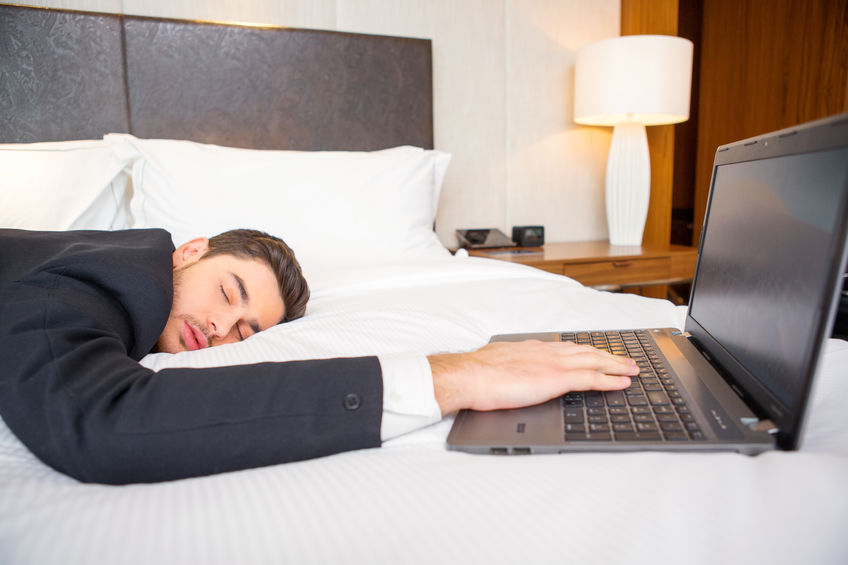What does a coworking space cost in Australia?

IN THIS STORY
Are you looking for a new space to work in Australia? Considering a shift from the traditional office space environment? Let’s look at what investment you might be looking at and considerations when working out what a coworking space actually costs.
Firstly, it depends on what level of coworking services you need, there are plenty of elements to consider. Fees vary depending on the location, facilities and services provided. For example, on average, a per-desk price is around $650-750 per month for a Coworking space in Melbourne, Australia.
Different coworking space pricing based on desk type
| Coworking services | Price |
| Day pass | $45-$55 per day |
| Part-time desk – per day | $35-$45 per day |
| Part-time desk – monthly membership | $350-$400 per month |
| Permanent desk | $650-$750 per month |
| Private office: up to 20 staff | $160-$210 per square metre per month |
| Private office: 20-50 staff | $150-$200 per square metre per month |
Exclude GST and other charges such as insurance, deposit, telephone service, IT, printing, mailbox and other fees.
Based on this, the average cost of a coworking space in Melbourne, Australia
is $670 for a permanent desk
Changes to coworking spaces – Costs in 2020, Australia
Over recent years prices have fluctuated. It was not until mid-2019 that Melbourne coworking spaces began charging more than $700 per desk per month. The 2020 pandemic has impacted prices further. Nowadays (July 2020), prices remain typically around the $650-$750 mark. This year, prices may drop further to attract new customers. Some may offer discounts in return for long-term contracts. It’s clear there will be a trend of down-sizing office space as companies reduce headcount and implement flexible work arrangements with fewer team members in the office at a time.
What to compare when considering coworking space costs
It’s important to compare what they include when you consider your costs. This can be difficult because different spaces offer different inclusions. The best coworking spaces in Melbourne, Australia charge a premium based on their location, facilities and brand reputation.
Most spaces include the following elements as part of the standard charge:
- Wi-Fi (part time coworking desk customers may have access to a different network than permanent desk customers)
- printing
- basic reception services
- shared kitchen with coffee and tea (sometimes fruit too)
- communal dining areas.
When it comes to other features, there’s numerous different inclusions and optional extras. Below are the questions you should ask to determine what’s included and what isn’t in your Australian coworking space.
Questions to ask potential coworking spaces
- Does it have an onsite or nearby café? (with decent coffee, this is Melbourne, Australia after all)
- Does the location suit your staff and is public transport nearby?
- Does it accommodate cyclists with bike racks, change rooms and lockers?
- Are showers available, and towels supplied?
- What parking is available? Is it ready to accommodate electric cars?
- What is the Wi-Fi speed and is it reliable?
- What are the printing capabilities and charges?
- Is it a wheelchair friendly coworking space?
- Do I need to be concerned about sharing a lift?
- What about after hours if I need to work late?
- What are the charges for faxing, scanning and binding?
- Do you get any listings in business directories or other similar benefits (such as the opportunity to present to other tenants)?
- What is stocked in the kitchen? Does it include tea, coffee, biscuits/snacks and fruit?
- Will I be locked-in to an inflexible contract?
- Are there any hidden costs in the monthly outgoings?
- Do you have access to meeting rooms for hire, ideation spaces and recreational spaces?
- Do you have access to event spaces and support when organising events?
- Are there spaces suitable for recording podcasts or Zoom meetings?
- Is it family friendly, with baby change facilities?
- Is it pet friendly?
- What reception services are provided? Will you get support for couriers and mail management?
What about cheap coworking spaces? What’s the difference?
If you are prepared to sacrifice services and convenience, you can secure locations in Australia at a cheaper rate. For a permanent desk, the lower rate is typically $600 per month. Locations in the outer suburbs of Melbourne or further from public transport tend to be cheaper. However they are not as convenient for staff who may incur travel time and expenses to get to work. Coworking spaces can also be cheaper if they have fewer facilities, such as meeting rooms or on-site kitchen. Or perhaps there’s fewer services, such as reception, telephone service or mail service. But, you may end up with out-of-pocket costs, thus negating any savings.
What does a permanent desk cost?
Most scaleups or downsizers are looking for permanent desks in Australia. While more expensive than hot desk arrangements, tenants get the benefits of shared office space with the convenience of a permanent space for each staff member. As with other coworking office spaces in Melbourne, permanent desk charges vary. A simple desk with few services, facilities in an outer-suburb location could start from $650 per month. While an CBD or inner-city, exclusive space with strong brand identity, extensive facilities and services can charge up to $750 per month. The average rate tends to be about $690 per month for a central location, variety of on-site facilities and services.
What’s the vibe of the place?
You want to compare the intangibles too. Is it a space you can see your team enjoying? Does it have a friendly, productive atmosphere? What are the hosts doing to encourage networking and socialising by the way of events, workshops and lectures? You want to feel that you’re in a space that facilitates growth, productivity and community. You can’t put a price on those intangible factors. But they make a difference to your success in the space. Some spaces are more creative and artistic, suitable for designers, freelancers and creatives. Others are geared towards tech, corporates, scale ups or startups. So think about how you’d fit alongside the other tenants.
Comparing coworking to office rentals
You may be comparing your shared coworking space in Melbourne, Australia to getting a private permanent office space or serviced office space. Here’s where it can get complicated. Many of the services provided in a shared office space aren’t included when you rent an office. So on paper, the office rental charge may be lower.
For example, with an office space you need to factor in these expenses:
- Office manager: someone to get the printer fixed, call the plumber for the blocked loo, grab coffees, wipe down the kitchen bench (and leave passive-aggressive signs) and handle reception duties
- Utilities: Wi-Fi, water, electricity and gas
- Cleaning: Can vary depending on size, but that large meeting room needs regular cleaning (whether you use it or not)
- Fitout: when you move in, you potentially need to setup the kitchen, bathroom, meeting rooms, desks and storage
Cost Comparison – Lease Vs LaunchPad

Easy mistakes to make when comparing coworking spaces costs
It can be easy to underestimate what you need and make a decision based on price alone. If you are a solopreneur, you can easily decide to try out the space for a few months. But, if you are moving your team of ten or more staff into a space, undertaking a brief trial is rather more difficult. You don’t want to realise after three months that the space isn’t working for you or the costs aren’t what you imagined.
The common mistakes people make include:
- Not accurately calculating how often they need meeting space. This means they either pay for a space they rarely use, or get stung with excessive meeting room charges each month.
- Getting a space that doesn’t allow for future growth. This means quickly outgrowing the location and cramming staff into a too-small space which impacts productivity and morale.
NOTE: A good coworking space builds this flexibility into the plan and has space to adapt the business as needed. - Getting a space that is too big. This means paying for desks for part-time staff that could be shared. Or paying for a larger office in anticipation of future growth that takes longer than expected. As above
- Not considering the price of setting up a coworking space. While this is far less expensive than fitting out a private rental space, there are charges involved such as setting up IT, moving staff, relocating your address on your printed materials, updating online listings (Google My Business, online directories) and getting staff moved to the new location in a seamless manner.
- Not considering the facilities you’ll actually use. Some tenants of coworking spaces in Melbourne, Australia are charged for numerous extras that they rarely use. A more simple solution without unnecessary frills may be more cost-effective in the long run.

